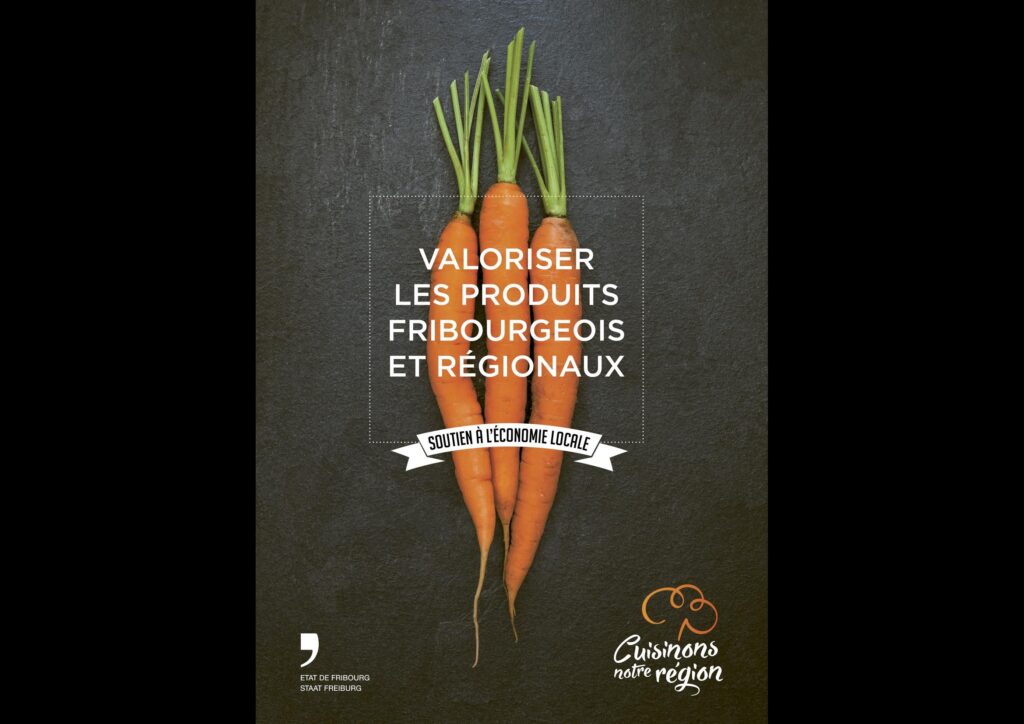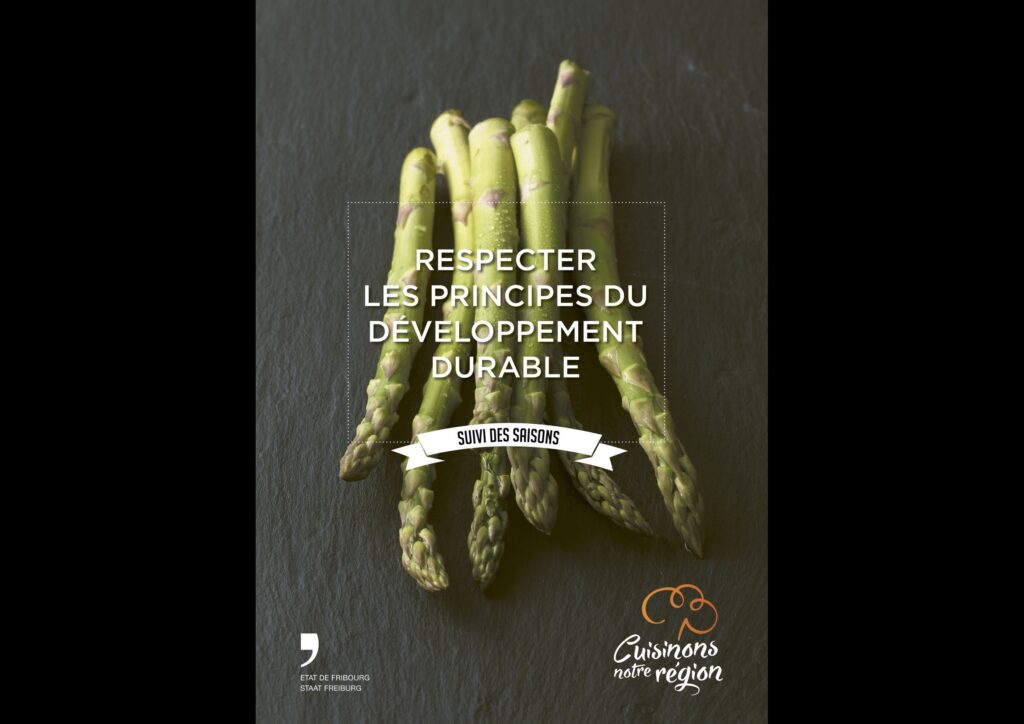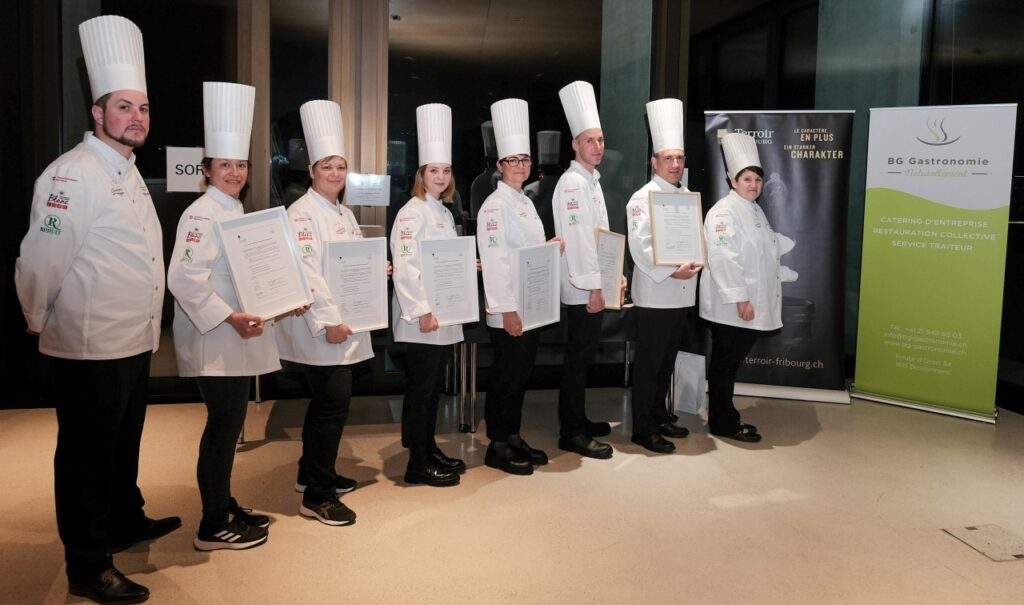The canton’s catering industry is in full swing! Fribourg products will increasingly feature on the menus of partner restaurants that have signed up to the Cuisinons notre région voluntary charter.
This sustainable approach promotes high-quality, varied and seasonal food, while enhancing the work of the canton’s producers and the health of consumers.

Buying “fribourgeois”
The public’s attitude to food is changing. While the provenance of foodstuffs is now of prime importance to consumers, this awareness was not as great in the past. Whether Fribourg establishments bring in bread from an Eastern European country, offer Brazilian poultry or beef from Uruguay was little known and little questioned. In 2014, MPs Romain Castella and Ruedi Schläfli tabled a motion calling for an increase in Fribourg products in collective catering. In 2018, the Grand Council enshrined the priority use of sustainable and local products in the law on agriculture. [1]
A charter for collective catering
The realization of this political will is part of the State of Fribourg’s Sustainable Development Strategy 2021-2031 and the Cantonal Health Promotion and Prevention Strategy. A Charter called Cuisinons notre région was adopted by the State Council in June 2021. Three State departments are supporting the Charter project: the Department of Institutions, Agriculture and Forests (DIAF), the Department of Planning, Environment and Construction (DAEC) and the Department of Health and Social Affairs (DSAS). Terroir Fribourg is supporting the implementation and smooth running of the project alongside four Charter partners: Fourchette verte Fribourg, GastroFribourg, Grangeneuve and Beelong.

A touch of Folly
On the Terroir Fribourg side, Christian Folly is responsible, together with Fourchette verte Fribourg, for supporting establishments in implementing the Charter. With his training as a chef and some 30 years’ experience in the catering industry, Christian Folly is the man for the job; he speaks the same language and knows the realities of the profession. “We’re quick to understand each other,” smiles the Treyval native, for whom putting Fribourg products and producers in the spotlight is a matter of course and an ongoing motivation. Coming from the industry, he also wants to raise the profile of institutional catering in the eyes of the public and highlight the creative work of professionals in the field. The challenge for chefs is not to bore an often identical clientele.
Voluntary and participative
The Cuisinons notre région Charter is part of a totally voluntary ethical approach. Signatories commit to a list of best practices, including freshness and regionality, sustainable food products, avoiding waste, saving energy and offering a varied, balanced diet. The Charter was largely inspired by the practice initiated six years ago by the canton of Valais. “Today, we can be proud: all the French-speaking Swiss cantons have signed a declaration of intent for the «Démarche latine Cuisinons notre région»,” says Christian Folly with satisfaction.

Benefits for partner establishments
The Cuisinons notre région membership process leaves several options open to interested establishments. In the first stage, Christian Folly draws up an assessment of the situation according to the criteria set out in the Charter, before the Charter is signed. In the second stage, the establishment can choose to continue the process with a Fourchette verte label. If so, the association’s Fribourg office joins in and begins the process. If not, Terroir Fribourg continues to support the chain alone, as is the case for each signatory.
In addition to annual reviews and advice, signatories are invited to take part in training courses and Sensi’terre that explore certain points of the Charter in greater depth. They can also benefit – on an annual basis – from an ecobalance and impact analysis of their food purchases carried out by project partner Beelong.
From now on, the digital platform De-Saison.ch makes it easy and free for producers and chefs to connect.
Establishments won over
The canton of Fribourg is home to around 100 public and semi-public catering establishments, which serve some 7 million meals a year, more than half of which are served in the medico-social establishments (EMS) that are members of the Association fribourgeoise des institutions pour personnes âgées (AFISA). Hospitals, clinics, prisons, schools and state service restaurants complete the picture. The Charter was initially adopted by five pilot establishments: the three restaurants of the University of Fribourg, the Grangeneuve restaurant and the Résidence des Bonnesfontaines restaurant in Fribourg.
In January 2022, BG Gastronomie in Bossonnens will join the “Cuisinons notre région” initiative. The Vevey-based company prepares 4,000 meals a day for six schools, mainly in the south of Fribourg: the Bulle OC, the Riaz OC, the Tour-de-Trême OC, the Collège du Sud in Bulle, the Bossonnens Central Kitchen and the German-speaking OC in Fribourg (DOSF). Today, other major partners – foundations, nursing homes, and municipalities – have joined the movement, bringing the total to 35 Partner Establishments. Christian Folly is delighted by these new memberships, and is confident about the future of the Charter: “There’s no doubt that collective catering accompanied by this approach has a great card to play, and that the relationship with chefs, their brigades and managers must be genuine and based on passion. Thank you to them!”
[1] LAgri art.3, al.1 g-i












